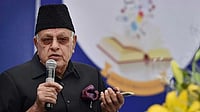Bangladesh's main opposition BNP today urged Premier Sheikh Hasina to follow in the footsteps of India's former prime minister Indira Gandhi, in handling the Rohingya crisis as the country is confronted by a refugee problem similar to the one faced by India in 1971.
"We saw the then Indian Prime Minister Indira Gandhi visiting important countries during our 1971 Liberation War. Only then the global initiative (to stop the Pakistani genocide) began," Bangladesh Nationalist Party (BNP) secretary general Mirza Fakhrul Islam Alamgir said.
He said BNP had long been advocating that the premier should play a special role to resolve the Rohingya crisis to convince countries which still support Buddhist-majority Myanmar, allowing it to carry on alleged atrocities against ethnic minority Rohingya Muslims.
The BNP is known for its hawkish stance on India as opposed to Hasina's ruling Awami League.
India crucially supported Bangladesh's 1971 Liberation War against Pakistan and offered refuge to nearly 10 million Bengalis who fled their homes in the face of genocide.
Alamgir's comments came as BNP chief and ex-prime minister Khaleda Zia departs for Cox's Bazar to witness the Rohingyas' plight as over 600,000 forcibly displaced people have taken refuge in southeastern Bangladesh after fleeing their homes in Myanmar's Rakhine state.
Bangladesh had previously sheltered 400,000 Rohingyas for the past few decades while the latest influx began on August 25 with a Myanmar army crackdown in response to alleged insurgent attacks on their security outposts in Rakhine.
Aid agencies and rights groups said the Rohingya crisis is spinning out of control with escalating violence, worsening health situation and poor access to conflict zones in Rakhine state fuelling the humanitarian crisis.
"I worry that this continued context of fear and violence is spinning out of control and will only lead to displacement of more people," International Committee of the Red Cross (ICRC) chairman Peter Maurer said this week.
UN investigators said during the latest crackdown, Myanmar's security forces fired indiscriminately on unarmed civilians, including children, and committed widespread sexual violence.
Despite initial reluctance to allow the Rohingya influx, Dhaka decided to provide them refuge on "humanitarian grounds".
But it has turned into the scene of the world's biggest refugee crisis presently while Dhaka tries to mobilise sustained global pressure on Myanmar to take back the Rohingyas while stopping alleged atrocities in Rakhine.
Hasina last month visited the Rohingya camps in Cox's Bazar and then attended the UN General Assembly in New York where she highlighted the plight of the Rohingyas and the impact of the crisis on Bangladesh.
PTI

























